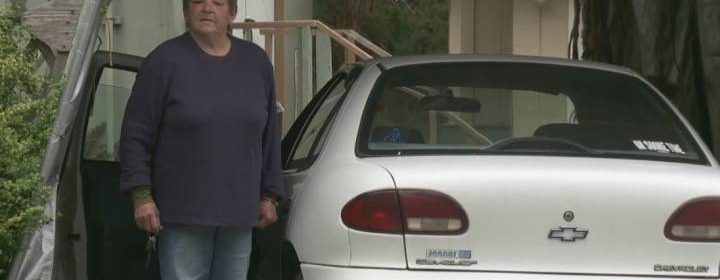Victoria area woman with Bell’s palsy failing breathalyzer fuels calls for change

Patty Dowler still struggles to get behind the wheel of her vehicle.
In October 2017, the Sooke woman dropped off some empty cans at the local beer and wine store before picking up some beer. On her way home she was pulled over.
The officer told Dowler she smelled alcohol on her breath but Dowler is adamant she was not drinking and the smell came from the cans that had been in the hot vehicle. She was then asked to do a breathalyzer.
WATCH: Senior with chronic lung disease fights DUI charge
“I just didn’t seem to be able to blow enough to make a reading on her instrument. I ended up doing five or six tries and still couldn’t do. I was feeling very stressed and ill and the officer told me she was going to impound my car and take my licence,” Dowler said.
“I realized it was my Bell’s palsy. I am not able to form that seal to do the sobriety test.”
Bell’s palsy is a a medical condition where face muscles are weakened.
Dowler says she asked for a roadside blood test and was denied. Three hours after having her car impounded her daughter brought her to get blood tested. The test came back negative.
There was no evidence at anytime that Dowler had any alcohol in her system.
As part of the appeal process, she submitted the blood test and produced a doctors not saying she was unable to properly seal her lips of the Bell’s Palsy.
“It was the worst experience of my life. I felt humiliated,” Dowler said.
“I knew there were probably people going by that knew me. It was just very, very stressful especially when I was unable to complete the test.”
Dowler is among a growing number of British Columbians raising concerns about the provinces roadside prohibition rules. Under the current legislation anyone who is unable to trigger the breathalyzer is penalized as if they are an impaired driver.
In February, Inger Forsyth had her car impounded after failing the test because of a bout of bronchitis. The 68-year-old with a perfect driving record was unable to make the breathalyzer register and was given an immediate roadside prohibition.
Like Dowler, her licence was suspended and her car was towed without any evidence of alcohol in her system. They were both also pulled over after visiting a liquor store.
WATCH: Vancouver Island senior victimized by unfair DUI laws?
Forsyth’s prohibition was eventually revoked by an adjudicator with Road Safety B.C. with the help of a lawyer. But she was still on the hook for thousands of dollars in legal costs.
“She wasn’t guilty of anything,” Forsyth’s husband Gary said.
“She said, ‘I don’t think I was speeding officer.’ He responded by saying there was nothing wrong with your driving. I just saw you come out of the liquor store, I’d like you to blow on this.”
The B.C. government says the review process in place for immediate roadside prohibitions has been in place for years and has withstood court challenges along the way.
One of the criticisms of the current system is that appeals of an immediate roadside prohibition are conducted by way of a written review, or an oral hearing held over the phone. They are attended by an adjudicator who often does not have substantial legal experience.
Victoria lawyer Michael Mulligan says the current rules force drivers to prove they were not drinking rather than the police prove that they were.
Drivers suspected of impaired driving used to be charged and were forced to appear before a judge. But in an attempt to catch more impaired drivers the provincial government brought in immediate roadside prohibitions. The change in process was also a way for the province to safe money.
Mulligan says the change “runs real risk of capturing innocent people” and should be changed to allow people to properly defend themselves.
“It’s obviously a legitimate goal trying to make sure that people are not impaired,” Mulligan said.
“The problem is when you combine the right to demand samples of anyone who displays no symptoms of impairment whatsoever and combine that with a provincial scheme that tries to permit expedited punishment of people without a fair appeal mechanism, it’s those things that will inevitably lead to the unfairness we have been seeing.”
–With files from Kylie Stanton
Sign up for our Health IQ newsletter
© 2019 Global News, a division of Corus Entertainment Inc.
Source: Read Full Article

